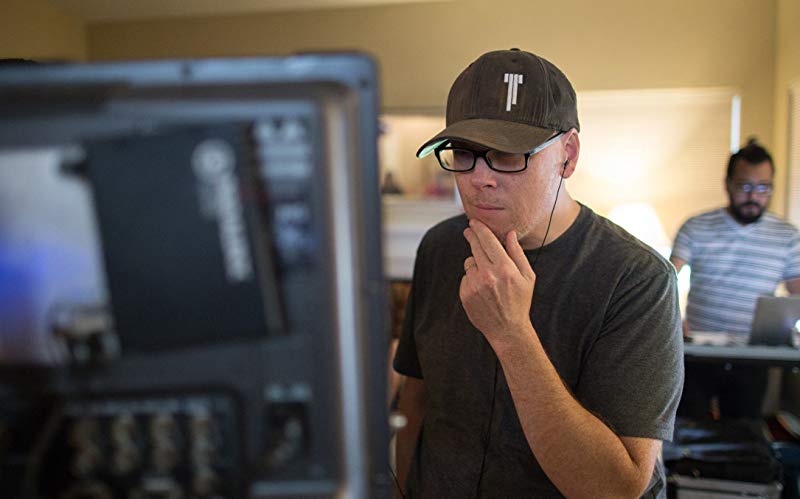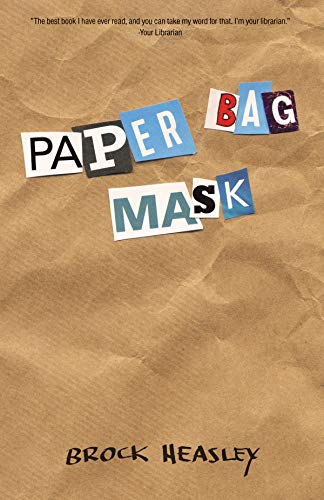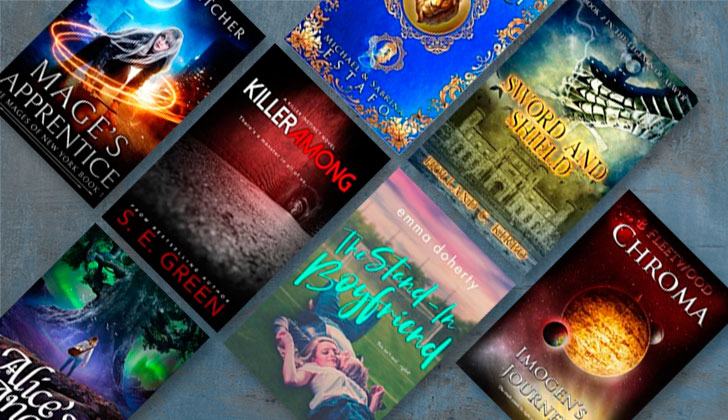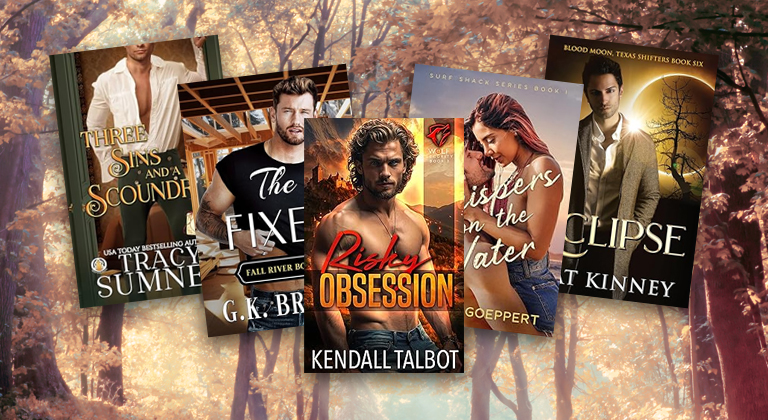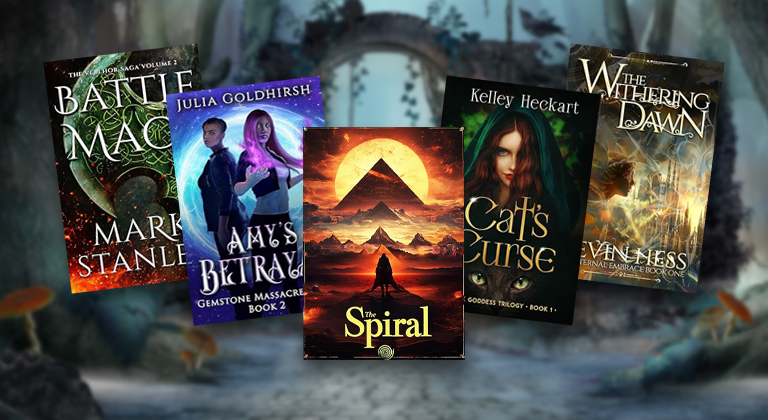Author Spotlight Interview: Brock Heasley
Today we’re excited to chat to another author – one whose debut book was extremely well-received by subscribers to Hidden Gems. Brock Heasley is a real renaissance man – a filmmaker, artist and writer – and his first novel Paper Bag Head has been described as “Ocean’s 11 meets The Breakfast Club.”
HG: When I first heard about you, I described you as a renaissance man! You’re a writer, an artist AND a filmmaker too! But how would you describe yourself?
BH: Um, busy? But, really, I’m just a storyteller who likes to work in as many mediums as they’ll let me, whether that’s books, comics, or film.
HG: So, tell me about yourself and your life.
BH: In a previous life I was a Graphic Designer and an Art Director, but just over four years ago my wife and I both lost our jobs within 24 hours of each other, sending us both on wildly different paths in life than we ever thought possible. She got her Master’s Degree in Communication and now works as a professor at a local college, and I got into film and rededicated myself to writing and getting published. I’m north of 40 but waaaaay south of 50 and live with my wife and our three daughters, two dogs, and one cat in Central California.
HG: Paper Bag Mask is your first book, correct?
BH: First published prose, yeah. Like a lot of writers, I have a couple of other books in the can that haven’t seen the light of day. The first of which secured me an agent, but unfortunately its only distinguishing mark is that it’s the first book she never sold. So, I am somewhat acquainted with failure, as are all writers worth their salt!
HG: When did your interest in storytelling develop, and what were your first attempts at it? When did you first start writing, or filmmaking. School? College?
BH: I came to writing late in life, when I was 28 years old. Blogging was a new thing and I was fascinated by the idea that you could write a thing, publish it, and hundreds of people could see it, all within the space of an hour. That was a pretty new concept back then. I tried it out and discovered that writing was a thing I enjoyed when it wasn’t for a term paper. And I wasn’t a terrible storyteller. I still had a lot to learn, but there was a spark there that I recognized that was unexpected.
If I could go back, I’d take some classes in college and switch majors, but I’m sure things played out the way they did for a reason. Nice to get some life experience under my belt, that’s for sure. Helps my writing a lot.
HG: What inspired Paper Bag Mask?
BH: Paper Bag Mask is, I like to say, about 40% true. Back in high school, some friends and I stole our history teacher’s wooden sword, a prized possession he called “The Whomper.” We kept it, held it for ransom, and sent him a ransom video. When he didn’t take us seriously, we stole something even bigger from him and held that for ransom. That’s when the police got involved and it got REALLY crazy. I used that story as my starting point, crafting a contemporary YA novel around it that touches on themes like self esteem, abuse, and friendship.
HG: How long did it take to write it?
BH: First draft was about 8 months, but after that I added in a lot of illustrations that took another three months. To depict the ransom videos, the book switches over to comic book style storytelling. I figured that would be a lot more fun than just describing the videos to the reader. And then there are smaller illustrations at the head of every chapter.
HG: How did you get into illustration?
BH: Illustration was my first love, ever since I was a kid. For a long time, all I wanted to do for a living was draw comics. But that fell by the wayside. I rarely draw anymore.
HG: Tell me about your comic book, SuperFogeys.
BH: The SuperFogeys is a comic I started back in 2006 about group of retired superheroes and villains who all live together in a retirement home called Valhalla. But it’s so much more than that jokey premise would indicate. I’m fascinated not by age so much as history, and what happens when you get a lot of people who have a long, shared history together. I wrote and drew the first 300 episodes before handing off art duties to Marc Lapierre, an extraordinary illustrator from Massachusetts who took the comic to new heights. We just completed a Kickstarter for our first collected volume, and all 300 pages of it will be in comics shops in the next couple months.
HG: How was the Kickstarter experience? Do you think that’s a good idea for creative types?
BH: I think it can be, depending on their following. Kickstarter is not great for grabbing new people, but it is a great way to market and fund a project by utilizing your existing base. It’s also a TON of work and responsibility because of the reward system and it requires a lot of prep with making a video and graphics and whatnot. A Kickstarter campaign is not for the faint of heart, but it can be a great way to fund a project that might not otherwise happen.
HG: What’s your writing process like? Did you plan and plot your book out first?
BH: Yeah, I’m a big planner, especially with a story like this that’s firmly within the heist genre. I have to know the end from the beginning or the twists and turns won’t be seeded properly and won’t make any sense. For Paper Bag Mask, I REALLY drilled it down to a chapter-by-chapter outline before writing a word of the regular prose. It helped immensely.
HG: What’s your writing schedule like? Did you set aside time every day?
BH: When I’ve got a writing project going–and that can be anything from a screenplay to a novel to a comic script–yes, I have to set aside time every day for writing. It almost doesn’t matter how much time that is, so long as I do it. It’s the discipline of every day that matters the most. I know it will get done if I’m at it every single day, just chipping away.
HG: What are your plans for the future? Working on anything new?
BH: I am working on a screenplay at the moment. After writing and directing two short films, “The Shift” and “The Two Hundred Fifth“, it’s time for me to try my hand at something bigger. I have high hopes!
HG: What’s your writing setup like? Do you have a space set aside?
BH: Haha. I wish. It’s me and my laptop. I’m in the bedroom, I’m in the dining room, sometimes I go to Panera Bread. So long as I’m uninterrupted and I’ve got my headphones and I can listen to my playlists, I can write just about anywhere.
HG: What’s the best piece of advice about writing you ever received?
BH: I think the best piece of advice is also the worst piece of advice, and it’s the advice everyone gets–“Write what you know.” It’s the best advice because you should be knowledgeable about what you’re writing to give your story that pop and that inner life and truth that all great stories need. It’s the worst piece of advice because I think people can use it as an excuse to not use their imagination and invent freely. For Paper Bag Mask, one of the things I did NOT do was research the way kids in high school act and talk today. I made zero attempts to use the proper slang or anything like that. Anytime a person does that, two things happen: 1) the story gets dated real fast and 2) it feels forced. So, I made a conscious decision to write what felt true–in a sense write what I know–and also to develop a rhythm and flow to the speech and the narration that is unique to the story itself. Not inventing slang so much as just trying to create my own world where teenagers talk THIS way and think THESE thoughts. I think it’s worked out. Most of the reviews I’ve gotten talk about how true the characters feel and how good the dialogue is, and I chalk that up to both accepting AND rejecting the advice to “write what you know.”
HG: What’s some advice you have for other authors?
BH: Oh my gosh. Absolutely none.
I know nothing.
But, if I’m forced to offer something, it’s this: know story. Forget writing. Lots of people can write flowery prose and make things sound pretty or dirty or horrific, etc. But really knowing how to put a story together with great characters is a rare gift. Learn that, and the other stuff will develop over time. But I don’t think people inherently know what makes a great story without putting in a real effort.
HG: Finally, what are your favorite books and authors? Or some of them, at least.
BH: My go-to is Dune by Frank Herbert for novels, Watchmen by Alan Moore and Dave Gibbons for comics, and Citizen Kane by Orson Welles or Gattaca by Andrew Niccol for film. All of those works have these incredibly thought-out worlds at their core that the reader/viewer puts together, but then these incredible stories are wrapped around them that are rooted in character. Those are the kinds of stories that get me most excited.


